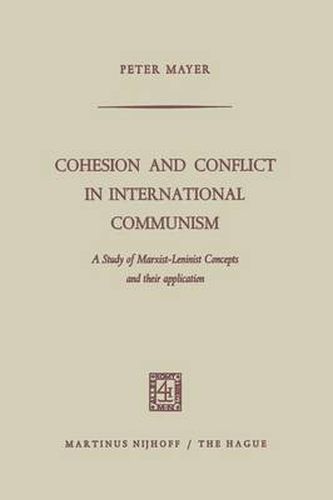Readings Newsletter
Become a Readings Member to make your shopping experience even easier.
Sign in or sign up for free!
You’re not far away from qualifying for FREE standard shipping within Australia
You’ve qualified for FREE standard shipping within Australia
The cart is loading…






This title is printed to order. This book may have been self-published. If so, we cannot guarantee the quality of the content. In the main most books will have gone through the editing process however some may not. We therefore suggest that you be aware of this before ordering this book. If in doubt check either the author or publisher’s details as we are unable to accept any returns unless they are faulty. Please contact us if you have any questions.
The current conflict which threatens the very existence of the inter national communist movement as a single coherent entity must be looked for in the roots of Marxian philosophy. The central concept of pre-Leninist communism is contained in the notion of proletarian internationalism.
Yet the emergence of the communist party-states has been squarely predicated on the requirements of single national states, as viewed through the training and experience of the various communist leaders. Thus the Soviet version has been shaped by the nationalism of Lenin, Stalin, and Khrushchev. The only aberrant case, the internationalism of Trotsky, was doomed to failure. The Chinese version of communism has as its root concepts the spirit of prolonged struggle against a superior enemy, whose ultimate defeat is ensured through the dialectics of political growth. The non communist societies are by definition decadent.
The movement came to power by exploiting the nationalism engendered within China by the Japanese invasion. Its mass support was based on the peasantry, although the transparent fiction of proletarian leadership was strictly maintained. Further, communism is a term which has lost its original encompassing definition. Peking now narrowly defines it as policies consonant with the thought of Mao Tse-tung.
Thus both the Soviet and the Chinese interpretation of commun ism are based on a concept which was anathema to the intellectual founders of the movement.
$9.00 standard shipping within Australia
FREE standard shipping within Australia for orders over $100.00
Express & International shipping calculated at checkout
This title is printed to order. This book may have been self-published. If so, we cannot guarantee the quality of the content. In the main most books will have gone through the editing process however some may not. We therefore suggest that you be aware of this before ordering this book. If in doubt check either the author or publisher’s details as we are unable to accept any returns unless they are faulty. Please contact us if you have any questions.
The current conflict which threatens the very existence of the inter national communist movement as a single coherent entity must be looked for in the roots of Marxian philosophy. The central concept of pre-Leninist communism is contained in the notion of proletarian internationalism.
Yet the emergence of the communist party-states has been squarely predicated on the requirements of single national states, as viewed through the training and experience of the various communist leaders. Thus the Soviet version has been shaped by the nationalism of Lenin, Stalin, and Khrushchev. The only aberrant case, the internationalism of Trotsky, was doomed to failure. The Chinese version of communism has as its root concepts the spirit of prolonged struggle against a superior enemy, whose ultimate defeat is ensured through the dialectics of political growth. The non communist societies are by definition decadent.
The movement came to power by exploiting the nationalism engendered within China by the Japanese invasion. Its mass support was based on the peasantry, although the transparent fiction of proletarian leadership was strictly maintained. Further, communism is a term which has lost its original encompassing definition. Peking now narrowly defines it as policies consonant with the thought of Mao Tse-tung.
Thus both the Soviet and the Chinese interpretation of commun ism are based on a concept which was anathema to the intellectual founders of the movement.